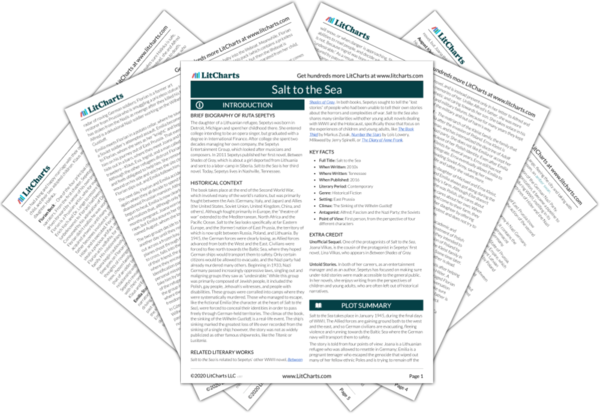Lwów Quotes in Salt to the Sea
I looked at the trees and thought of the big stork’s nest I had seen on top of the barn. It made me think of Mama. I thought of the warm sunny days when she would take me to pick mushrooms in the forest. In the forest near Lwów was a beautiful old oak tree with a hollow large enough to sit in. We’d take our baskets to the tree and I’d scramble into the cavity. Mama would sit with her back against the trunk, legs crossed at the ankles beneath her skirt.
“You love stories, Emilia. Well, the trees hold hundreds of years of stories,” she’d tell me, touching the bark. “Think of it, everything these trees have seen and felt. All of the secrets are inside of them.”
“Do you think they remember each and every stork?” I’d ask from inside the cool hollow.
“Of course the trees remember. Like I said, they remember everything.”
Just as the trees were Mama’s favorite, storks were mine. I had them six months of the year. At the end of each summer the storks would leave and fly to Africa, where they’d live in warmth along the Nile for the winter. In March they would return to Poland to the nests they had left. To invite a stork to nest, families would nail a wagon wheel to the top of a tall pole. We had one in our yard. Every March we would celebrate when our stork returned to the nest. As August faded, the departure of the storks symbolized summer’s end.
Six years ago, the day our stork left, Mama left too. She died giving birth to what would have been my younger brother.
My throat tightened. I swallowed, reminding myself she wasn’t really gone. I felt Mama among the trees. I could feel her touch and hear her laughter in the leaves. So I talked to the trees as I walked, hoping their braches would carry messages up to Mama and let her know what I had done, and most of all, that I would try to be brave.
The Nazis claimed I didn’t need an education. Polish schools were closed. Our desks and equipment were taken to Germany. Would a German girl open my desk and find my treasures inside?
The Nazis said the people of Poland would become serfs to the Germans. They thought we only needed to count and write our name. My father was part of the Lwów School of Mathematics. He would never agree with children not being taught reading, writing, and arithmetic. They had burned our books in the Polish language. But I had learned to read very young. They could never take that away from me.
She should know Poland. Looking at the child, I suddenly became hungry for my country, for its fat bees carrying nectar from apple flowers and for the birds singing in clusters of hazel.
How would she know the truths from the untruths? Would she believe that Poles, Jews, Ukrainians, Armenians, and Hungarians had all coexisted peacefully in Lwów before the war? That I often made tea and doughnuts with Rachel and Helen in our kitchen?
Food. I wanted her to know our food. How my hands missed the feel of dough dusted with flour. My ears missed the snap of apple pancakes in the pan and my yes missed the rainbow of fruits and vegetables sealed in jars on the shelves. War had bled color from everything, leaving nothing but a storm of gray.
I wanted her to know not only Poland, but my Poland.
I pulled her close and whispered in Polish: “There were no ghettos, no armbands. I often fell asleep to a breeze floating through my open window. It’s true. It was like that once.”












